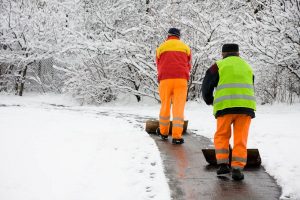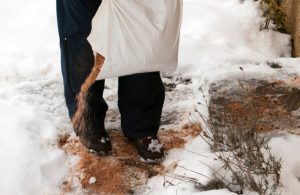Winter has descended in full force, and with it comes blizzards, nor’easters, and every other type of snowstorm. It also brings the potential for some serious water pollution. While managing the ever-growing blanket of snow and ice this winter, be sure to keep these tips in mind in order to protect our water supply and environment.
 Shovel early and often. While this may not seem like much of a pollution deterrent, it actually makes a huge difference. Removing the bulk of snow before it is allowed to freeze greatly reduces the amount of deicing products needing to be applied. Consider utilizing a garden hoe to remove that last pesky layer of ice.
Shovel early and often. While this may not seem like much of a pollution deterrent, it actually makes a huge difference. Removing the bulk of snow before it is allowed to freeze greatly reduces the amount of deicing products needing to be applied. Consider utilizing a garden hoe to remove that last pesky layer of ice.- Dispose of all of that shoveled snow in vegetated areas, and avoid shoveling into streets or waterways. Snow that is shoveled into the street has nowhere to go but into storm drains and streams, picking up pollutants along the way. However, snow disposed of in vegetated areas will soak into the ground, reducing the amount of polluted runoff entering waterways. The ideal place to dispose of snow is in a rain garden.
- Avoid using deicers such as rock salt as much as possible. When winter ends and all of the snow and ice starts to melt, the remaining salt finds its way into storm drains and streams, and enters our drinking water supply untreated. Rock salt wreaks havoc on aquatic life and can cause dead zones at the bottom of lakes and reservoirs. Because it is so widely used, northern water bodies are becoming increasingly overloaded with salt, and the cleanup is both expensive and energy-intensive. In addition to polluting the environment, salt deteriorates pavement and concrete, corrodes vehicles, and leaches into soil, which changes soil composition and inhibits plant growth. It is also detrimental to pets’ health when ingested and paws when walked upon. Other deicers such as calcium chloride, potassium chloride, and acetates do not contain salt and are a better option, but should still be used only very sparingly, as they still have a detrimental effect on the environment.
 Use only the smallest amounts of sand required for traction control. While admittedly a better option than deicing products, sand has the potential to cause environmental damage as well. Sand can clog storm drains, causing flooding. It can also enter surface waters, clouding the water, burying the ocean floor, and filling in habitats. Due to these environmental concerns, sand should be used only sparingly on icy surfaces and should be swept up promptly at the first sign of spring. Sawdust is an alternative option for traction control that causes less pollution. Still, it should also be swept promptly in the spring.
Use only the smallest amounts of sand required for traction control. While admittedly a better option than deicing products, sand has the potential to cause environmental damage as well. Sand can clog storm drains, causing flooding. It can also enter surface waters, clouding the water, burying the ocean floor, and filling in habitats. Due to these environmental concerns, sand should be used only sparingly on icy surfaces and should be swept up promptly at the first sign of spring. Sawdust is an alternative option for traction control that causes less pollution. Still, it should also be swept promptly in the spring.- Pick up pet waste regularly. It can be tough to get motivated to pick up Fido’s waste when the windchill is sub-zero. However, pet waste is loaded with bacteria that enters our waterways through runoff at the first thaw. Don’t wait until spring to clean up after your pets. A little proactive prevention really helps to preserve the integrity of our drinking water supply.
 Choose a commercial car wash facility over washing your car at home. While those warm winter days may entice you to break out the garden hose and bucket, the residual water has nowhere to go but down the driveway, particularly when there is a lot of snow cover. Bringing with it soap, dirt, and pollutants along the way, this water enters storm drains and waterways untreated. The Clean Water Act requires that car washes to pipe their used wash water directly to water treatment plants or into state-approved drainage facilities specifically designed to protect the environment. In addition, a commercial car wash uses about half the water used during a home wash. The negligible cost of a commercial car wash is well worth the benefit to the environment.
Choose a commercial car wash facility over washing your car at home. While those warm winter days may entice you to break out the garden hose and bucket, the residual water has nowhere to go but down the driveway, particularly when there is a lot of snow cover. Bringing with it soap, dirt, and pollutants along the way, this water enters storm drains and waterways untreated. The Clean Water Act requires that car washes to pipe their used wash water directly to water treatment plants or into state-approved drainage facilities specifically designed to protect the environment. In addition, a commercial car wash uses about half the water used during a home wash. The negligible cost of a commercial car wash is well worth the benefit to the environment.- Dispose of ashes from heating stoves properly. Wood ash contains many elements that can be beneficial to gardens including potassium, calcium, sodium, magnesium, and phosphorus. Therefore, composting wood ash is acceptable. However, coal ash absolutely must be disposed of at a landfill or ash recycling center. Coal ash contains elements such as cobalt, boron, and arsenic, which are toxic to people, animals, plants, and our waterways.

